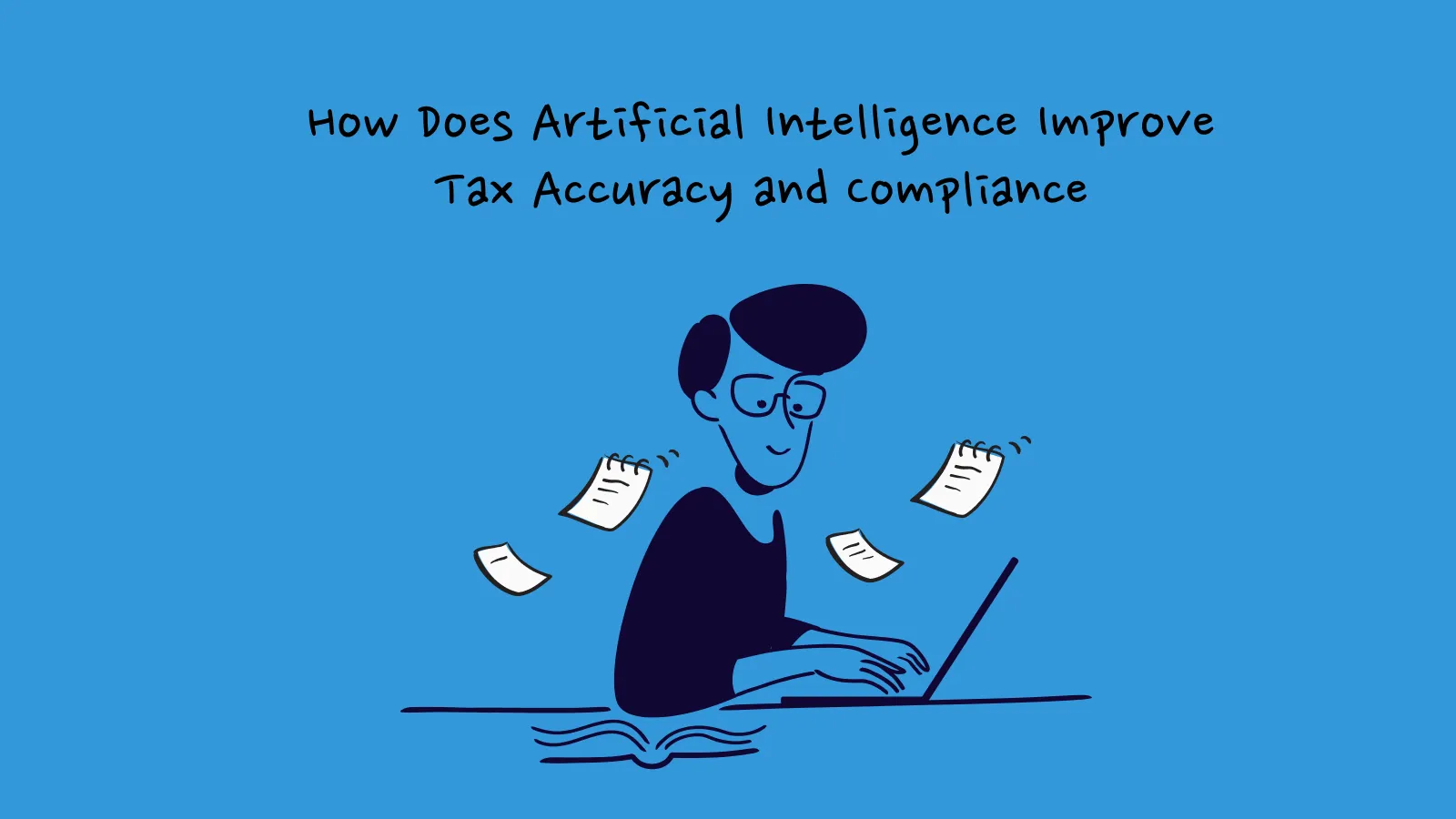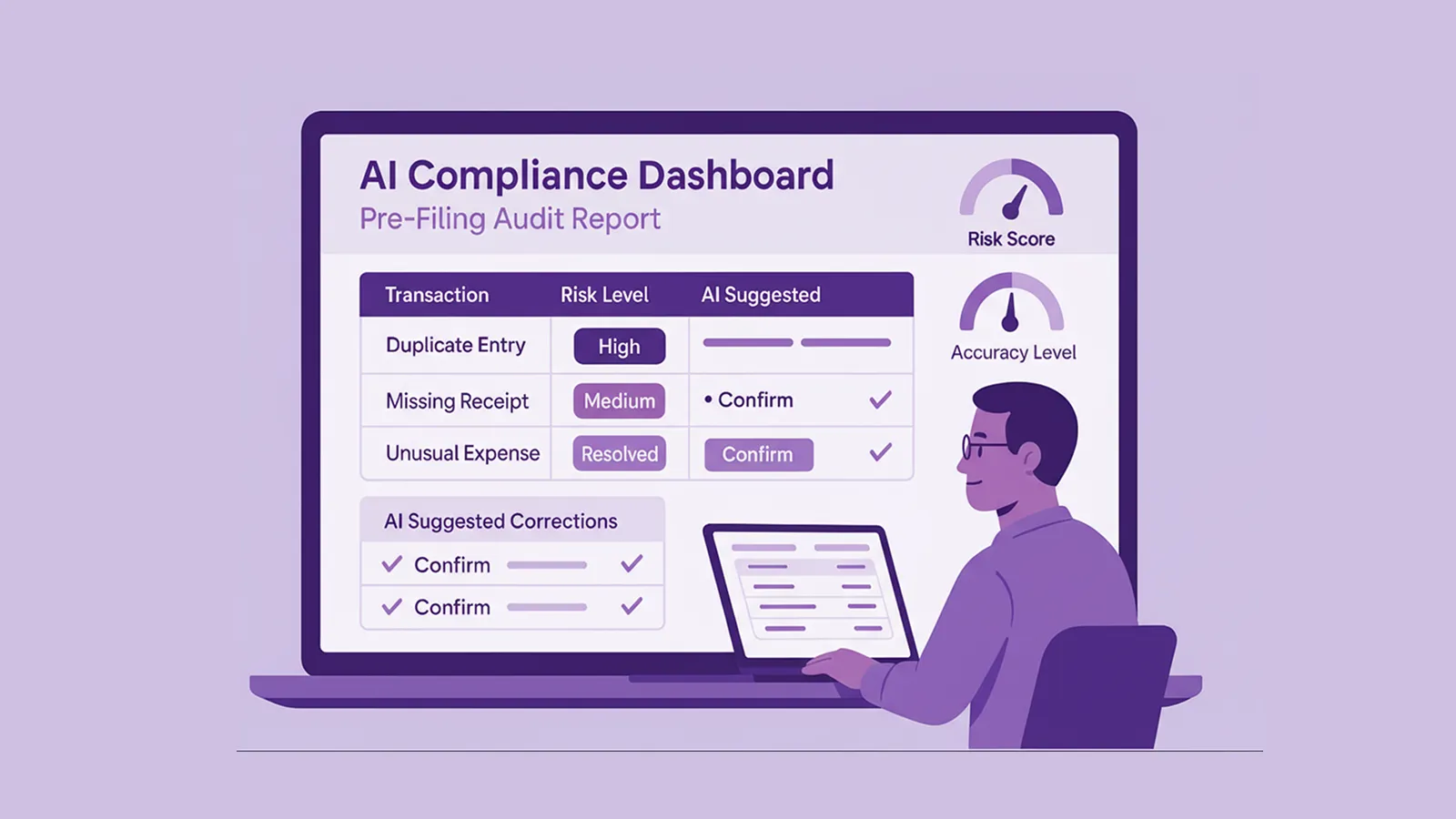How Does Artificial Intelligence Improve Tax Accuracy and Compliance

Staying compliant with tax laws is a recurring challenge for growing startups.
As operations scale, so do reporting requirements, potential errors, and audit risks. Founders often find themselves spending too much time on tax prep or relying on costly external help to stay compliant. What they truly need are smarter, more reliable systems that make tax management less reactive and more predictable.
AI is transforming how startups handle tax compliance by automating data entry, detecting errors, and staying updated with the latest tax codes without human intervention. AI simplifies complex tax processes, and with that, not only improves accuracy but also gives founders the peace of mind that their filings are precise, compliant, and audit-ready.
How AI Tools Improve Tax Filing Accuracy and Reduce Costly Errors
AI reduces manual entry errors by automatically pulling, classifying, and preparing tax data from different systems. Instead of going through multiple spreadsheets or re-checking every figure, startups can rely on AI to ensure every transaction aligns with the right category and filing rule. This leads to fewer missed deductions, cleaner financial records, and tax filings that hold up under scrutiny without needing a larger finance team.
Here’s how AI makes tax filing more accurate:
- AI syncs with accounting and payment platforms to collect and reconcile financial data automatically.
- It classifies income and expenses accurately across all categories and forms.
- It minimizes calculation errors by validating figures before filing.
- It detects and prevents common filing mistakes that often trigger audits.
How AI Adapts to Ongoing Tax Law Changes Without Manual Oversight
There are so many tax changes happening. And, for startups managing taxes across multiple states and keeping up with every change can be overwhelming.
AI removes that burden by continuously scanning official tax databases and automatically updating calculations and forms based on the latest rules. This ensures filings remain accurate, even when regulations change mid-year.
.webp)
This automation protects startups from missing new credits, deadlines, or thresholds that could affect compliance or potential savings. Founders no longer need to monitor every IRS bulletin or state notice; AI does it in the background, keeping filings current and reliable.
Here’s how AI stays up to date with tax law changes:
- AI scans IRS and state agency databases in real time to identify new updates or rule changes.
- It applies those rule changes to tax logic and filing templates automatically, without human input.
- It sends timely alerts about new thresholds, deductions, or credits that could impact filings.
AI’s adaptability means startups can grow without worrying about falling behind on compliance. Whether it’s a sudden change in state sales tax or an updated federal deduction, the system adjusts instantly. This minimizes the risk of non-compliance and also ensures startups can claim every possible credit on time.
How AI Detects Tax Risks by Analyzing Patterns and Anomalies in Financial Data
Tax compliance is not just limited to filing it correctly and on time. True compliance means catching mistakes before they lead to problems.
For startups, even small missteps like double-counted expenses or missing receipts can lead to penalties or raise red flags during audits. AI helps detect these issues early by analyzing thousands of transactions, learning what “normal” looks like for your business, and flagging what doesn’t fit.

Here’s how AI helps identify tax risks on time:-
i) Spot Hidden Errors Before They Turn Costly
Startups often deal with fragmented data across multiple tools. You could be using accounting software, payment apps, spreadsheets, and more. This creates room for manual inconsistencies that are hard to notice in real time.
AI continuously scans these records, comparing each entry with historical data to identify potential risks such as duplicate invoices, unusual vendor activity, or mismatched figures.
ii) Learn from Patterns, Not Just Past Mistakes
Unlike static rule-based systems, AI evolves as your financial data grows. It recognizes recurring transaction types and adapts to your business model, improving accuracy with every cycle.
When something deviates from the norm, like an expense ratio spike or inconsistent category labeling, it alerts you instantly. This proactive detection allows startups to correct issues before filing, saving both time and money.
Here’s how AI improves tax risk detection:
- AI flags outliers and misclassifications in real time by comparing transaction trends with prior data.
- It identifies incomplete or missing documentation that may cause compliance gaps.
- It suggests precise corrections and reclassifications before tax filings are finalized.
iii) Turn Risk Detection into a Compliance Advantage
AI reduces risk, yes. But it also builds confidence.
When your financial records are constantly monitored and verified, you enter every tax season prepared and audit-ready. This consistency also reassures investors and partners that your startup manages compliance responsibly. Over time, AI turns what was once a reactive, stressful process into a predictable, reliable routine that scales with your business.
How AI Enables Year-Round Tax Planning Instead of Last-Minute Filing
For most startups, tax planning begins only when deadlines approach. This reactive approach often leads to missed deductions, inaccurate estimates, and penalties.
AI changes this by turning tax planning into a continuous process rather than a once-a-year task. AI tools analyze live financial data and give founders real-time visibility into how their spending, revenue, and deductions affect future tax liabilities.
AI-driven platforms also allow startups to simulate different business scenarios such as hiring more employees, entering new markets, or adjusting pricing, and instantly see how those changes influence tax outcomes.
This proactive planning helps founders make informed financial decisions while keeping compliance and cash management in balance all year round.
AI-driven tax planning improves strategic decision-making. Founders gain the ability to plan budgets, forecast tax obligations, and allocate resources more effectively. Instead of rushing to reconcile accounts during filing season, startups can stay tax-ready throughout the year, with full confidence in their numbers and no last-minute surprises.
How AI Helps Startups Prepare for Tax Audits with Organized, Verifiable Data
Tax audits often cause panic. Not because startups have done something wrong, but because finding the right records in time is exhausting. AI changes that experience completely.
Instead of sorting through months of receipts or mismatched spreadsheets, founders can rely on continuously organized, verifiable data that’s ready when needed. Here’s how:-
i) Build Audit-Ready Records Automatically
AI captures and structures every financial transaction the moment it happens. Each entry is automatically tagged with source information such as invoices, receipts, or payment confirmations, and stored in a searchable format. This eliminates the need for manual recordkeeping and ensures that your books stay audit-ready all year round, not just at filing time.
ii) Maintain Traceability with Linked Documentation
One of AI’s biggest advantages is its ability to create digital trails. It connects every number on a tax return back to its origin whether that’s a vendor payment, payroll report, or bank transaction. This level of traceability makes it easier for startups to validate figures instantly, cutting down the time and cost of responding to audit requests.
AI generates audit-ready reports that connect figures to verified documentation. It links transactions with receipts, invoices, and payment records in one secure dashboard.
iii) Turn Audit Readiness into Investor Confidence
Being audit-ready is a mark of financial maturity. When a startup can produce clean, well-documented records instantly, it signals reliability to both auditors and investors. This level of transparency strengthens trust, reduces risk, and positions the company for smoother due diligence in future funding rounds.
How Inkle Uses AI to Help Startups Stay Accurate and Compliant
For growing startups, managing tax compliance manually can be time-consuming and error-prone. Inkle brings automation, intelligence, and precision together to simplify this process.
It handles bookkeeping, data checks, and tax preparation automatically so that founders can focus on strategy instead of spreadsheets. Inkle uses AI to manage classification, compliance tracking, and report generation, and ensures that financial data stays accurate and audit-ready every single day.
Here’s how Inkle helps startups stay compliant with confidence:
- Inkle automatically classifies transactions across multiple accounts for clean, accurate bookkeeping.
- It continuously monitors compliance metrics to flag missing data or filing inconsistencies.
- It generates filing-ready tax reports that meet both U.S. and cross-border reporting requirements.
- It keeps financial records verifiable and accessible, ensuring startups are audit-ready at all times.
With Inkle, startups don’t have to wait until tax season to know where they stand. Every entry, report, and alert is powered by AI, ensuring precision without the manual grind. Whether your company operates in one state or across borders, Inkle helps you file faster, stay compliant, and maintain investor-grade accuracy from day one.
Ready to simplify tax compliance for your startup? Book a demo with Inkle and see how AI-driven accuracy can keep your business compliant, confident, and audit-ready all year round.
Frequently Asked Questions
How does AI improve tax compliance for startups?
AI improves compliance by automating transaction classification, applying the latest tax rules, and continuously checking for inconsistencies. This reduces manual work and ensures every filing reflects accurate, up-to-date data.
Can AI help prevent tax penalties or audits?
Yes. AI systems detect potential errors, missed deductions, or incorrect filings before submission. By fixing these issues early, startups minimize the risk of penalties and avoid triggering audits.
How often do AI tax tools update for new regulations?
Most AI-powered tools scan for updates daily or weekly. This ensures that filings automatically reflect the most recent IRS and state tax code changes without requiring manual updates.
Is AI tax planning only useful during tax season?
Not at all. AI offers year-round benefits by tracking deductions, estimating quarterly taxes, and projecting future liabilities. It transforms tax management into a continuous process instead of a seasonal rush.
Do I need to be technical to use AI tax tools?
No. AI-based platforms like Inkle are designed for non-experts. They run quietly in the background, simplifying compliance tasks through easy dashboards and automated workflows.
How secure is my tax data with AI-powered tools?
Reputable platforms use bank-grade encryption and strict access controls. Inkle, for example, complies with leading data security standards to ensure every financial record remains private and protected.




.png)